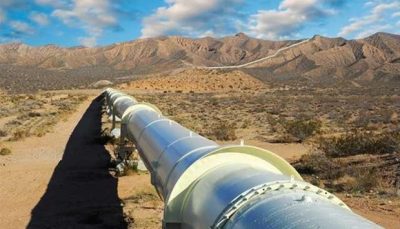The Most Crucial Pipeline of the Middle East?

Contemporary Middle Eastern history is strongly influenced by energy politics. Besides providing revenue for the state’s coffers, oil is also a potent geopolitical tool in the hands of resource-rich countries. Recently, officials from Lebanon, Syria and Iraq have engaged in talks to restart the dysfunctional pipeline that once connected oilfields near Kirkuk in Iraq with the coastal city of Tripoli in Lebanon. Restarting the pipeline could have long-term political, economic, and strategic consequences for the involved states and the wider region.
The original infrastructure was constructed during the 30s of the previous century when two 12-inch pipes transported oil from Kirkuk to Haifa in British mandated Palestine and Tripoli in French-mandated Lebanon. The Tripoli line was supplemented by a 30-inch pipeline in the 50s which could transport approximately 400,000 barrels/day. The Kirkuk-Tripoli pipeline was suspended by Syria during the Iraq-Iran war in an attempt to support Tehran in its struggle against Baghdad.

Paving the way
The current political climate, which has enabled cooperation between Lebanon, Syria, and Iraq, is the consequence of one country’s foreign policy. Since the U.S. invasion of Iraq and the overthrow of Saddam Hussein, Iranian influence has grown considerably across the Middle East. Tehran’s support for proxies in neighboring countries has strongly influenced regional politics and made Saudi Arabia nervous of what it sees as “Persian encroachment”.
The Iranian support for Syria’s President Assad provided a lifeline to the regime during the country’s civil war. Tehran has invested significantly in maintaining the position of its ally in Damascus. In neighboring Iraq, the democratization process installed a Shia-dominated parliament which is supported by powerful paramilitary groups funded and organized by the Quds force, the branch of Iran’s Revolutionary Guard responsible for extraterritorial activities. Despite significant military and political gains, consolidation is required to cement the ties between Iran’s Arab partners, which would also benefit Tehran.
The art of the deal
While Iran’s participation in regional politics was necessary for creating the right environment for cooperation, Russia’s involvement has proven to be crucial. The Kremlin’s decision to participate in the Syrian civil war on the side of Assad’s forces was a pivotal moment in reestablishing control over territories essential for the Kirkuk-Tripoli pipeline to commence operations. Moscow has also established good political relations with both Iraq and Lebanon to become a broker for facilitating an agreement.
The participation of Rosneft was very useful for Moscow’s efforts in the region. The Russian energy giant maintains good relations with the Iraqi government where it operates several oil fields and the Kirkuk-Ceyhan oil pipeline. Recently, Rosneft signed an agreement with the Lebanese government to operate the storage facility in Tripoli for the next twenty years. Therefore, Russian involvement was important for the Arab countries to consider refurbishing the outdated Kirkuk-Tripoli pipeline.
Despite the modest capacity of the pipeline, reestablishing trade could have a long-term impact on regional politics. The new pipeline would be a physical link between the participating countries and will cement the political ties for decades due to interdependency regarding energy security and the economic interest of energy exports.
Uncertainties ahead
Despite the intention to reinvigorate the old Kirkuk-Tripoli pipeline, it remains unclear whether the project will see the light of day. Especially the situation in Syria creates a veil of uncertainty which makes construction and operation a problematic task. Although the Syrian government has reestablished control over Eastern Syria, IS remains a threat to stability with attacks being an almost daily occurrence. It is uncertain whether the depleted and exhausted Syrian army will be able to secure the pipeline while engaging the remaining rebel-held areas in Idlib.
Also, it can be expected that Washington won’t idly sit by while its rivals in Moscow and Tehran entrench themselves even further in the region. Therefore, for now at least, talks of reinvigorating the pipeline will continue behind closed doors until the security situation improves significantly.
*
Note to readers: please click the share buttons above or below. Forward this article to your email lists. Crosspost on your blog site, internet forums. etc.
Vanand Meliksetian is an energy and utilities consultant who has worked with several major international energy companies. He has an LL.M. from VU Amsterdam University Law and Politics of International Security where he wrote his thesis on Russian-European energy relations. He specializes in international legal and political developments.

